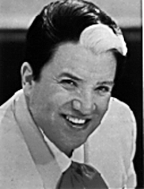
Miguel Aceves Mejía
Encyclopedia

Mexico
The United Mexican States , commonly known as Mexico , is a federal constitutional republic in North America. It is bordered on the north by the United States; on the south and west by the Pacific Ocean; on the southeast by Guatemala, Belize, and the Caribbean Sea; and on the east by the Gulf of...
actor
Actor
An actor is a person who acts in a dramatic production and who works in film, television, theatre, or radio in that capacity...
, composer
Composer
A composer is a person who creates music, either by musical notation or oral tradition, for interpretation and performance, or through direct manipulation of sonic material through electronic media...
, and singer.
Miguel Aceves Mejía, or "the King of the falsetto
Falsetto
Falsetto is the vocal register occupying the frequency range just above the modal voice register and overlapping with it by approximately one octave. It is produced by the vibration of the ligamentous edges of the vocal folds, in whole or in part...
" as he was popularly known, was born in Ciudad Juárez
Ciudad Juárez
Ciudad Juárez , officially known today as Heroica Ciudad Juárez, but abbreviated Juárez and formerly known as El Paso del Norte, is a city and seat of the municipality of Juárez in the Mexican state of Chihuahua. Juárez's estimated population is 1.5 million people. The city lies on the Rio Grande...
in the state of Chihuahua. He became a popular Mexican film star during its golden age and was widely regarded for his interpretations of various Mexican musical folkloric genres, particularly the ranchera
Ranchera
Ranchera is a genre of the traditional music of Mexico originally sung by only one performer with a guitar. It dates to the years of the Mexican Revolution in the early 20th century. It later became closely associated with the mariachi groups which evolved in Jalisco. Ranchera today is also played...
.
Originally part of a traveling theater company, Aceves began recording for the first time in 1938 with the trio Los Porteños. At the beginning of his career he interpreted mainly boleros, tangos
Tangos
Tangos is a flamenco palo closely related in form and feeling to the Rumba. It is often performed as a finale to a Tientos. Its compas and llamada are the same as that of the Farruca and share the Farruca's lively nature. However, Tangos is normally performed in the A Phrygian mode.Tangos is...
, and Afro-Cuban
Afro-Cuban
The term Afro-Cuban refers to Cubans of Sub Saharan African ancestry, and to historical or cultural elements in Cuba thought to emanate from this community...
rhythms. During his career he recorded more than 1000 songs on 90 discs and starred in over 60 films.
Among his greatest hits are La Barca de Guaymas, El Pastor, La del Rebozo Blanco, Se Me Hizo Fácil, Yo Tenía un Chorro de Voz, Vaya con Dios
Vaya Con Dios
' may refer to:* "Vaya con Dios" , a song written by Larry Russell, Inez James, and Buddy Pepper* Vaya Con Dios , a Belgian band** Vaya Con Dios , their debut album...
, La Malagueña Salerosa
Malagueña Salerosa
Malagueña Salerosa also known as La Malagueña is a well-known Son Huasteco or Huapango song from Mexico, which has been covered by many performers....
, El Jinete, El Crucifijo de Piedra and Cuatro Caminos. He was noted for composing such songs as El Pescado Nadador and O, Gran Dios, even though his forté was primarily as a singer in his own right.
Following the rise to popularity of Jalisco-born ranchera singer, David Záizar
David Záizar
David Záizar was a Mexican ranchera singer and actor who appeared in many Mexican films. He was active from the 1940s up until his death in 1982 due to a respiratory infection. What earned him the title of the "Rey del Falsete" or "King of the Falsetto" was the fact that he displaced Miguel Aceves...
. Mejía's status as "the King of the falsetto" was given to Záizar by the public.
In 1945, Aceves began dedicating himself solely to singing and, following the deaths of Pedro Infante
Pedro Infante
José Pedro Infante Cruz , better known as Pedro Infante, is the most famous actor and singer of the Golden Age of Mexican cinema and is an idol of the Latinamerican people, together with Jorge Negrete and Javier Solís, who were styled the Tres Gallos Mexicanos . He was born in Mazatlán, Sinaloa,...
and Jorge Negrete
Jorge Negrete
Jorge Alberto Negrete Moreno is considered one of the most popular Mexican singers and actors of all time....
, ventured into the world of cinema.
In 1959 he appeared in Amor se dice cantando
Amor se dice cantando
Amor se dice cantando is a 1959 Mexican- Argentine comedy-drama film directed by Miguel Morayta and written by María Luisa Algarra...
.
Aceves died just a few days short of his 91st birthday on November 6, 2006 in Mexico City
Mexico City
Mexico City is the Federal District , capital of Mexico and seat of the federal powers of the Mexican Union. It is a federal entity within Mexico which is not part of any one of the 31 Mexican states but belongs to the federation as a whole...
. As is tradition in Mexico, his body lay under the rotunda of the Palacio de las Bellas Artes (Palace of Fine Arts) in Mexico City. This honour is reserved for only the greatest Mexican figures of arts and letters.http://www.prensamexicana.com/news.php?nid=7620&clave=a%3A1%3A%7Bi%3A0%3Bs%3A13%3A%22miguel+aceves%22%3B%7D

